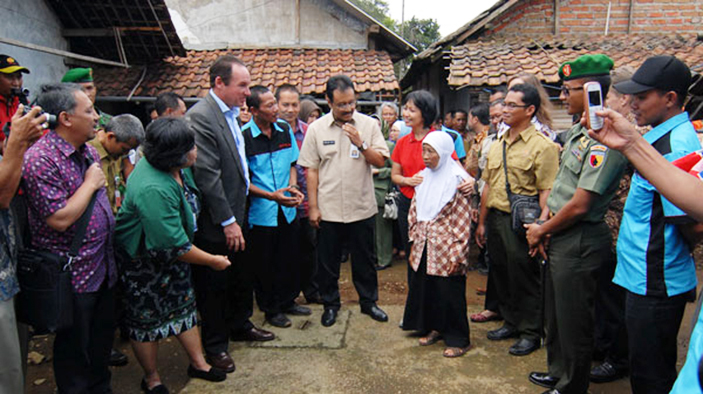Private and Civil Society Partnership Boosts Water Supply in Indonesia
February 20, 2014
East Java’s dwindling supply of raw water is being replenished thanks to an initiative launched by the U.S. Agency for International Development (USAID) and two key partners in Indonesia’s private and civil society sectors.
The USAID-funded Indonesia Urban Water, Sanitation, and Hygiene (IUWASH) project, the Coca-Cola Foundation Indonesia, and Yayasan Lingkungan Hidup Seloliman—a local nongovernmental organization—last month celebrated the construction of 650 water infiltration ponds designed to channel more water into the water table.

(The inauguration of the ponds was attended by the U.S. Consular General, Vice Governor of East Java Province, and the Deputy District Chief of Mojokerto.)
More and more Indonesian water utilities are facing shortages of raw water due to environmental degradation in upstream areas. Changing rainfall patterns have already led to declines in water from local aquifers. With less raw water available, efforts to expand access to safe water for Indonesia’s rapidly growing urban population are hampered.
Water infiltration ponds capture rainwater that would normally be lost as runoff into nearby streams and, instead, allow it to infiltrate the ground and recharge the aquifer. Water stored in the aquifer can then be extracted either through wells or natural springs for downstream users.
“The infiltration ponds help to conserve ground water, especially during the dry season,” said Saifullah Yusuf, the Vice Governor of East Java province.
One of IUWASH’s partners, the Coca-Cola Foundation Indonesia, has provided $750,000 to fund construction of such ponds as part of Coca-Cola’s global Water Replenish initiative, which works to make the company “water neutral”—so it replenishes as much water as it uses for its operations.
“We will build 250 more infiltration ponds in Mojokerto and initiate a similar program in Central Java,” said Titie Sadarini, Corporate Affairs Director of Coca-Cola Indonesia. “With the completed ponds, they will channel millions of liters of water into the water table. Thousands of households in the surrounding areas will benefit from sustainable water supply.”
IUWASH works to expand access to water and sanitation services to Indonesia’s urban poor by improving urban water and sanitation services, mobilizing demand for these services, improving governments’ capacity for service delivery, and contributing to government strategies. The IUWASH team provided technical assistance and monitoring for the project.
RELATED CONTENT:
Documentary Describes How Project Delivers Clean Water for 1.8 Million Filipinos
A recently released 15-minute documentary describes how a DAI-led project in the Philippines made it possible for water providers to expand and upgrade their systems, and deliver water services to another 1.8 million people.
Read More